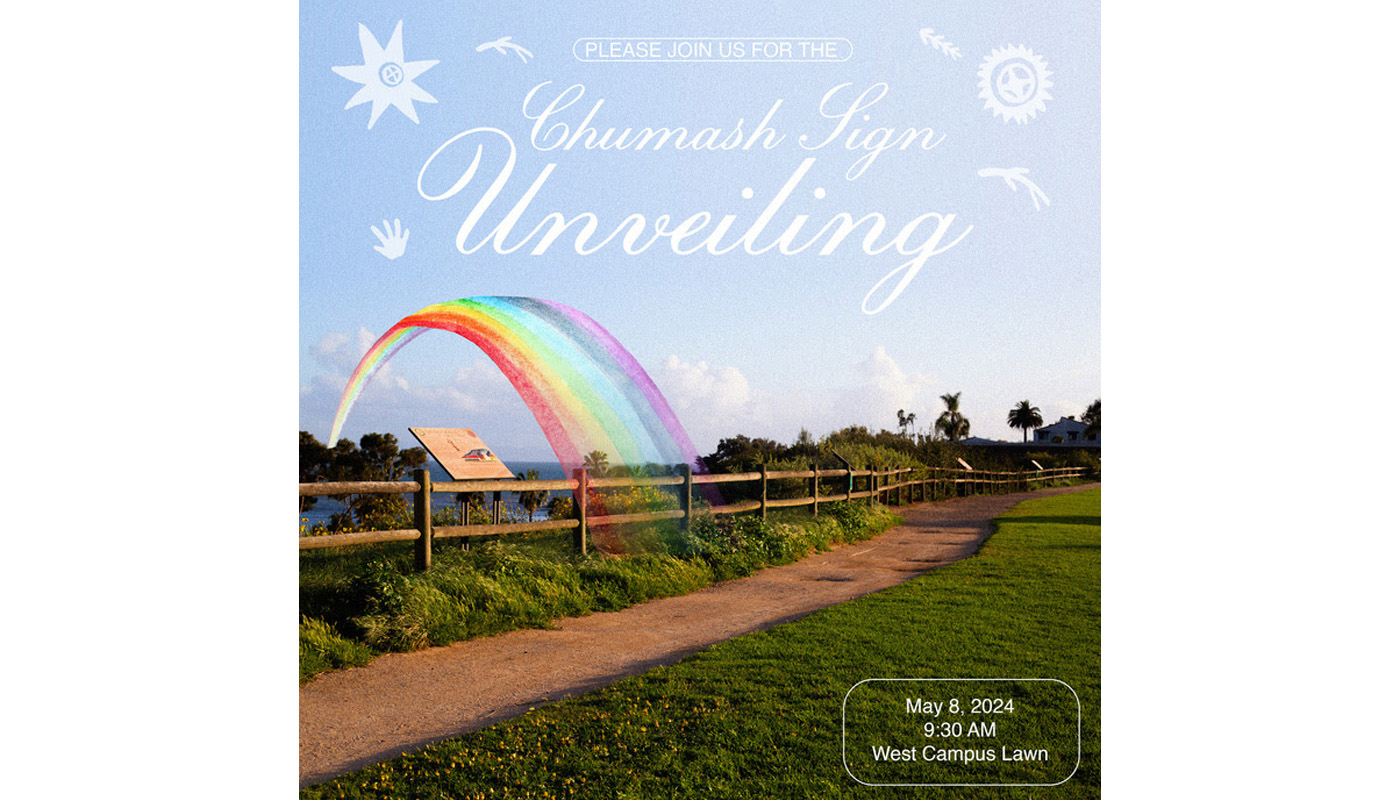
Tomorrow: Chumash Sign Unveiling Ceremony Honors Chumash People and the Villages of Mispu and Syuxtun
Santa Barbara, Calif. (May 7, 2024) - Santa Barbara City College (SBCC) and the Chumash Signage Project Committee are excited to invite the campus and community at large to officially share the Chumash Signage Project that has been added to the SBCC West Cliff Drive Campus. The event will be held tomorrow (Wednesday) morning, May 8, from 9:30-10:30 a.m., at SBCC West Cliff Campus Great Meadow. (See event details below.)
The sign installation is a series of educational signs along the bluffs of campus.
The signs cover a wide range of topics from history, language, and art as well as
more recent history of colonization and the ways Chumash people continue to resist
and thrive. Each sign is accompanied with stunning artistic elements to bring the
stories to life in a visual way.
The bluffs and Great Meadow along the West campus of SBCC are the site of the village
of Mispu. It was part of a larger network of villages of Syuxtun, the original village
site name of Santa Barbara near the harbor. The sign series joins the SBCC Chumash
Preserve as spaces that will give more visibility to Chumash culture and history on
campus. This was a collaborative project between a team of Chumash and other Indigenous
community members, as well as SBCC and the SBCC Foundation. This vibrant project has
been in the works for almost nine years and is a start to address a long history of
erasure on the SBCC campus.
“Being able to work on this project and do a deep dive into our culture and language
felt like a good use of all the skills I’ve learned in community and in school the
last few years. I am excited for Chumash youth to be able to see our story in such
a powerful way that talks about us in the present tense,” said Maura Sullivan, Chumash
Signage Project Committee member.
“We put so much love and care into these signs. There are a lot of little details
that I hope people who are reading the signs notice. Everything we included has intention,
has a purpose, was discussed and researched extensively. It’s been an honor to have
been asked to be a part of this project and help create the visuals,” said Solange
Aguilar, visual artist and Chumash Signage Project Committee member.
Chumash Signage Project History
In 2016, an art installation that featured what resembled a tepee was erected on the
Great Meadow causing a campus-wide controversy that sadly led to the harassment and
bullying of Indigenous students, who were accused of imposing artistic censorship
and likened to political terrorists.
The art installation was eventually dismantled, but serious harm was caused and healing
was needed for the Chumash and Indigenous communities and the campus.
“That was a very painful time to be a faculty member at SBCC, a place I had been a
part of since I was eighteen years old,” said Annette Cordero, English Department
member at the time of the incident.
Cordero - who retired in 2020 - explained that the Chumash Signage Project has been
an attempt to create something beautiful and positive to heal the wounds that were
inflicted during that time and encourage greater understanding of the Chumash culture.
“I give a great deal of credit to Dr. Kim Monda, who was president of the Academic
Senate at the time and began to question why there was little to no physical representation
of our culture on campus,” Cordero continued.
According to Cordero, Monda convinced the SBCC administration to set aside funds to
pursue a signage and art project on the West Campus near the location where the offending
structure had been erected. Thus, the project began.
The creation of the signs involved a series of planning meetings that drew upon community
knowledge as well as historical accounts. Once the writing process was underway, the
artistic elements were created for original illustrations that brought to life some
of the major events and details about Chumash life. Along with the signs on campus,
there will also be a QR code which can be scanned for further reading and resources.
“I love to create art with my relatives,” said Stephen Franco, another member of the
Chumash Signage Project committee. “Inspiring one another. Wholeheartedly supporting
one another. This is the journey I went on with Annette, Maura and Solange. Having
hours-long conversations. Whittling down vast amounts of information, oral history
and writing. Deciding and agreeing on what to share that best tells and depicts our
stories not only in our past but in our present. I am excited for the students and
all who walk the bluffs at Mispu to observe and read these signs.”
In November of 2023, a small gathering of Chumash people came together to view the
final drafts of the signs and their placement. It was a special gathering with youth
and elders sharing appreciation for the art project’s acknowledgement of the Chumash
culture. Further projects on campus will continue. The Chumash community is also in
conversations about ongoing ways the SBCC campus and community can be in more supportive
connection with Chumash people.
Thank you to the Chumash Signage Project Committee, Geoff Green, Mark Broomfield,
Amanda Jacobs, Jordan Killebrew, Alexandra Thierjung, Kirsten Mathieson, Martha Swanson,
Hong Lieu, Robert Schwemmer, Steven Saffold, Hana Graham, SBCC and the SBCC Foundation
for taking this next step in healing for Chumash and Indigenous peoples.
Press release by the Chumash Signage Committee on behalf of Jordan Killebrew
- - - - - - - - - -EVENT DETAILS
Chumash Signage Unveiling
Wednesday, May 8, 2024
Light refreshments will be provided for the event.
9:30-10:30 a.m.
SBCC West Cliff Campus Great Meadow
PARKING ON WEST CAMPUS WILL BE OPEN DURING THE HOURS OF THE EVENT.